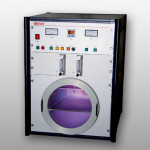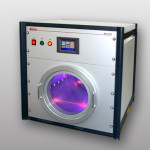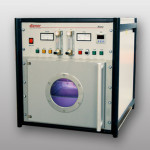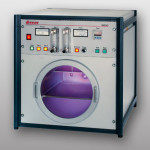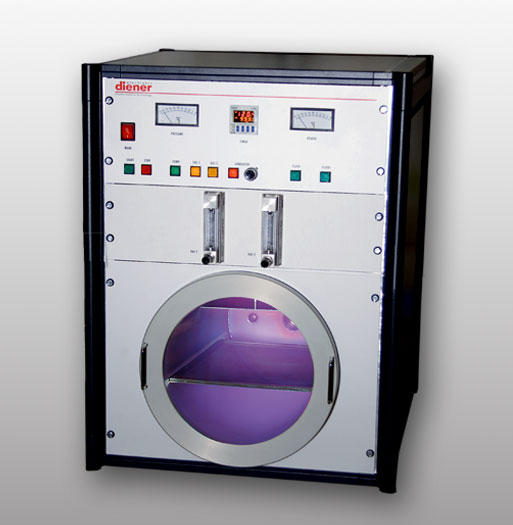
Diener Nano
Nanoplasmasystemen kan kombineras i olika varianter på ett modulärt sätt. Nedan hittar du en översikt över de vanligaste alternativen med hjälp av Nano-plasmasystemen.
Plasmaprocess
Rengöring
Ytaktivering
Etsning
Plasmapolymerisering
Nanoplasmasystem används främst inom följande sektorer:
- Analys
- Arkeologi
- Fordon
- Forsknings- och utvecklingsavdelningar
- Halvledarteknik
- småserietillverkning
- Plastteknik
- Medicinsk teknik
- Mikrosystemteknik
- Sensorteknik
- Sterilisering
- Textilteknik
Grundläggande konfiguration
– Den yttre kroppen varierar beroende på komponenterna/tillvalen
– Kammarvolym: beroende på version 18 – 36 liter
– Strömförsörjning: 230 V AC för bordssystem eller 400 V AC/ 3 faser för fristående system
Gasförsörjning
– Nålventil
– Massflödesregulator (MFC)
Vakuumkammare
– Rund i rostfritt stål
med lock
(ca Ø 267 mm, L 420 mm eller L 600 mm) eller
rektangulär med gångjärnsdörr
(ca B 240 x H 240 x D 420 mm eller 600 mm)
– Rund aluminium
med lock eller med gångjärnsdörr
(ca Ø 240 mm, L 400 mm eller L 600 mm)
– Kvartsglas (UHP)
runt med lock eller med gångjärnsdörr
(ca Ø 240 mm, L 400 mm eller L 600 mm)
– Borosilikatglas (UHP)
runt med lock eller med gångjärnsdörr
(ca Ø 240 mm, L 400 mm eller L 600 mm)
Laddas med
Bricka (tillval: vattenkyld), kvartsglasbåt, roterande trumma för pulver, roterande trumma för bulkmaterial, platt bricka Aluminium, platt bricka rostfritt stål, platt bricka borosilikatglas, platt bricka kvartsglas
Elektroder
– Elektrod på en eller flera nivåer
– RIE – elektrod
Styrning
– Halvautomatisk
– Grundläggande datorkontroll (Microsoft Windows CE)
– Fullständig datorkontroll (Microsoft Windows 10 IoT)
Mätning av tryck
– Pirani
– Kapacitetstryckmätare (för korrosiv gasversion)
Timer
– Digital
Generator
Frekvenser:
- 100 kHz: effekt 500 W
- 80 kHz: effekt 1000 W
- 13,56 MHz: effekt 0 – 100 W; 0 – 300 W
- 2,45 GHz: effekt 0 – 600 W
Alla generatorer är steglöst justerbara från 0 – 100%
Vakuumpump
-i olika storlekar från olika tillverkare (som krävs med aktivt kolfilter)
Fler alternativ
Reservdelssatser, tryckmätare, korrosiv gasversion, gasflaska, tryckreducerare, faraday-box, polymerisationsutrustning, testbläckset, oxygengenerator, långsam ventilation av vakuumkammaren, långsam nedpumpning av vakuumkammaren, underhåll/service, dokumentation, installation på plats.

